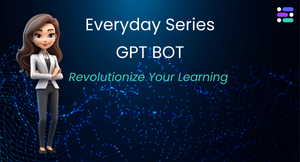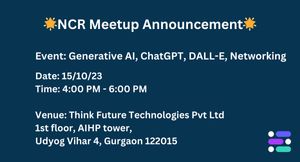Everyday Series is a newsletter for daily topics on AI, web3 and cryptocurrency. Aimed for both novice and professionals, it is delivered online, by email and over WhatsApp.
First things first:
We started off on a good note this week. We were able to launch a substantial part of the website, iron out lots of issues in our technology, reach out to the audience and launch the "Getting Started" week. Thanks a lot for supporting with membership, ideas and spreading the word out.
Let us summarise the things we covered:
Topics Covered so far
Monday

Tuesday

Wednesday

Thursday

Friday

These topics are a part of the getting started module and we will keep on updating these and all the posts regularly to keep them relevant to the domain of AI.
There were a couple of minor tech improvements as well mainly in the home page design and delivery. I and my team am fastly ironing out the technical issues to make it come alive soon.
Every weekend we planned to share bonus content that is relevant to the domain of AI and the one that we think benefits all of us the most. It included but was not limited to practical use cases, discussion on how a specific product is built, job and startup market, code repository etc. among others.
In this spirit, this week we will talk about High Paying AI careers to pursue.
High-Paying AI Careers to Pursue

There’s no doubt that artificial intelligence (AI) is one of the most rapidly growing and exciting fields today. With AI technology becoming increasingly prevalent in our lives, the demand for skilled professionals in this area is also on the rise. If you’re looking for an interesting and high-paying career to pursue, then consider a job in AI!
Some of the top jobs in AI include software engineer, data scientist, machine learning engineer, and product manager. These roles require a range of skillsets and experience, so if you’re interested in pursuing a career in AI be sure to do your research and find out which role would best fit your skillset. We will unravel different job roles and what they mean.
In terms of salaries, jobs in AI can be quite lucrative. Data scientists typically earn around $120-200k per year while software engineers make around $150k annually in the USA market. Salaries of half a million USD are not unheard of in the domain. And with the rapid growth of this field and demand for the skills, these salaries are only going to continue to increase!
Let's break it down to understand which profile pays what kind of salaries and how can you prepare yourself for this:
Let's understand what is leading to this rise in salaries for those pursuing careers in AI?
- AI is disrupting everything and hiring talent for AI is growing by 30-40%
- There is a big talent gap between the demand of industry and the skills available
- AI engineers are earning high salaries around the globe
- Good AI engineers are in a position to demand good salaries as well as positions and many are raising capital for their startup
- The domain is most diverse in nature and needs interdisciplinary skills to master it
- AI opportunities are abundant and hence, either if you are a freelancer or a product developer, if you understand your domain well, your skills are in demand.
Breaking the domains
What is the difference between a data scientist and a machine learning engineer or data analyst? if this is a question that you ask often, you are not alone.
In fact that's the most common question that's asked by readers. Before I discuss different domains and job roles, let's talk about the key qualification to have in AI.
However, there is a list of key qualifications for an AI engineer.
- Master’s or Ph.D. in statistics, mathematics, or computer science
- Experience using statistical computer languages such as R, Python, SQL, etc.
- Knowledge of machine learning techniques
- Knowledge of advanced statistical techniques
- Experience in
- data mining techniques
- using web services
- analyzing data
- with distributed data/computing tools
- visualizing data
If we look at the metric above, it almost covers decent knowledge of mathematics, statistics, tools for web development, computation and data analysis, machine learning techniques and above that business acumen and ways to explain it to the rest of the team and hence have presentation and communication skills. That's why it's a very rare and in-high demand job.
Let's move to different job roles:
Machine Learning Engineer
A machine learning engineer is a software engineer with a focus on data science. They use big data tools to create models that can handle large amounts of real-time data. Machine learning engineer jobs require applicants to have strong mathematical skills, experience with machine learning and deep learning, and programming skills in Java, Python, and Scala.
Data Scientist
A data scientist needs an advanced degree in statistics, mathematics, or computer science, and must be able to understand unstructured data and statistical analysis. They must also have experience with cloud tools like Amazon S3 and the Hadoop platform, as well as programming skills with Python, Perl, Scala, or SQL. Additionally, a data scientist should have a working knowledge of Hive, Hadoop, MapReduce, or Spark.
BI Developer
Business intelligence (BI) is a process that helps organizations collect, organize, analyze and report on data to help make better business decisions. A BI developer is responsible for designing and implementing BI solutions. They work with teams of data analysts, data scientists and other developers to gather requirements, design schemas and models, develop reports and dashboards, and troubleshoot issues.
A BI developer must have strong analytical skills as well as experience in SQL or another programming language. They must also be able to effectively communicate with stakeholders to understand their needs and ensure that the BI solution meets those needs.
Big Data Architect
A big data engineer or architect is responsible for designing, implementing and managing a company's big data infrastructure. They work with teams of developers to create and manage systems that can handle large volumes of data quickly and efficiently.
Big data engineers must have a strong understanding of both traditional database systems and modern big data technologies. They must also be able to effectively manage the resources needed to run these systems, including hardware, software and personnel.
Big data engineers and architects develop ecosystems that enable various business verticals and technologies to communicate effectively. Compared to data scientists, this role can feel more involved, as big data engineers and architects typically are tasked with planning, designing, and developing big data environments on Hadoop and Spark systems.
The role of a big data engineer or architect is essential in today's world where companies are collecting more information than ever before. By ensuring that their company's big data infrastructure is efficient and scalable, they can help ensure that their organization can make the most use of this valuable resource.
Most companies prefer professionals with a PhD in mathematics, computer science, or related fields. They also need to have experience in data mining, data visualization, and migration.
MLOps Engineer/ Developer/ DevOps for ML
Machine learning operations (MLOps) is a relatively new job role that has emerged in recent years to help organizations take advantage of machine learning. The goal of the MLOps engineer is to make sure that the machine learning process runs smoothly and efficiently, from data preparation to model training and deployment. In addition, they are responsible for monitoring and optimizing models in production, troubleshooting any issues that may arise, and ensuring that data pipelines are reliable and scalable.
If you're interested in becoming a machine learning ops engineer, there are a few things you can do to prepare yourself. First, make sure you have strong Python skills; most MLOps work is done in Python. You should also be familiar with big data technologies such as Hadoop or Spark, as well as containerization technologies like Kubernetes. Finally, it's important to have some experience with DevOps practices such as version control (Git), continuous integration/continuous delivery (CI/CD), and automated testing frameworks like Selenium or WebDriverIO.
Research Scientist
A research scientist in AI is responsible for developing new methods and technologies to enable machines to learn and act autonomously. They are more academic in nature. They work on algorithms that allow systems to understand natural language, recognize objects, and make decisions. Much of their work is focused on machine learning, which is a method of teaching computers how to learn from data without being explicitly programmed. This allows scientists to create systems that can improve over time as they are exposed to more information.
Data Analyst
A data analyst is someone who takes raw data and turns it into something useful. They might analyze it to find trends, or they might use it to make decisions about how to run their business.
Data analysts need to be able to understand complex data sets, and they need to be able to communicate their findings in a way that everyone can understand. They are often responsible for creating reports and presentations that help decision-makers make informed decisions.
The role of a data analyst is essential in any organization that relies on data for making informed decisions.
Computer Vision Engineer
Computer vision engineers are responsible for developing and improving the algorithms that allow computers to interpret digital images. This includes tasks such as identifying objects in pictures, understanding facial expressions, and tracking movement. Computer vision engineers must have a strong background in mathematics and physics, as well as experience with programming languages such as C++ or Python. They also need to be able to work closely with other members of a software development team, including graphic designers and user interface experts.
Natural Language Processing Engineer
A natural language processing engineer is responsible for developing and improving algorithms that allow computers to understand human speech and text. They work on programs that can recognize patterns in words and syntax, as well as identify the meaning of sentences. This is a highly technical field, requiring expertise in mathematics, computer science, AI, and linguistics.
The role of a natural language processing engineer is essential in making sure that computers can interact with humans effectively. By developing better algorithms, they help make it possible for people to communicate with machines using their native language. This technology has many practical applications, from helping doctors diagnose patients remotely to providing customer support through chatbots.
There are many other roles that stem out of the combination of the above as well as the combination above with the domain and product that the company is working on.
Key Skills in Demand
There are a few key skills that are essential for anyone looking to pursue a career in AI. The first is strong math skills which are clear by now. AI relies heavily on mathematical concepts such as calculus, linear algebra, and probability theory. A second key skill is programming experience. Many AI algorithms are written in languages such as Python or R. Finally, it’s also important to have some knowledge of machine learning algorithms and how they work.
If you want to start developing these skills, there are a few resources you can use:
Mathematics: Khan Academy offers free online courses in mathematics that can help you build the foundation you need for working with AI algorithms. Advanced courses on statistics and mathematics can be taken once you have got a hold on the basics.
Programming: Codecademy offers interactive tutorials that teach you how to program using different languages, including Python and Lisp .
Machine Learning: Coursera offers online courses on machine learning from some of the world’s leading universities, including Stanford University and the University of Toronto
Deeplearning: Google’s Deeplearning 101 is a free online course that covers the basics of deep learning. Some of these courses may require you to have some prior knowledge of programming or machine learning, but they are still a great resource if you want to learn more about these topics.
C/C++: If you want to learn about programming in C++ or C, then you can check out this tutorial from the website Cprogramming.com. There are also many other resources available online, such as online forums, blog posts, and video tutorials. Whatever resource you choose, make sure that it is interactive and engaging so that you can get the most out of it.
Neural Network Architectures: Udacity is a good resource for learning about Neural Network Architectures and how can they be used for building different AI models.
Python, R, Java: The best resource to learn Python or any other language is to start coding and start from their documentation. If you are a novice, you can get the "for dummies" series, subscribe to YouTube videos and take Udacity/Coursera courses
Other skills that you must have and helps your application includes:
Business Acumen, Data Visualization, Data Analysis, Algorithms, Statistics and Domain expertise. We will cover many of these in future posts, so stay tuned for these posts.
How to Become a Data Scientist
Data Science is at the intersection of all these activities. So it makes more sense to understand how to become a data scientist.
There’s a lot of buzz around data science and for good reason! The field is growing quickly, and it offers opportunities to work on interesting and challenging projects. But what does it take to become a data scientist?
The first step is to get familiar with the basics of data science. This includes learning about the different types of data, how to collect and cleanse data, how to perform basic analysis, and how to create models. There are lots of resources available online that can help you get started.

Once you have a basic understanding of the concepts involved in data science, you need to start applying them in practice. This means working on real-world projects and datasets, building your own models, and refining your skills. There are many ways to gain experience in this field – you can participate in online competitions or hackathons; join a local Data Science Meetup group, or find an internship or job at a company that deals with big data analytics.
I occasionally run various meetups where we discuss various topics on Data Science and AI.
AI- Creatives is one such group with more than 6,500 AI enthusiasts. https://meetup.com/AI-Creatives
The final step is continuing your education by taking courses or getting certified in Data Science topics like machine learning algorithms or probabilistic modelling techniques. This will help keep you up-to-date on the latest developments in the field and ensure that you stay competitive as a data scientist.
Salaries for AI Engineers
Salaries for AI Engineers are on the rise! As businesses race to adopt AI technology, the demand for qualified engineers continues to grow. According to recent studies, AI engineer salaries have increased by an average of 6% in the past year.
Leading companies are now offering competitive salaries and generous benefits packages in order to attract top talent. At Google, for example, an AI engineer can expect a salary of $200,000 or more. And at Facebook, the average salary is over $250,000.
So what does it take to become an AI engineer?
In addition to a strong technical background and experience in machine learning or data mining algorithms, employers are looking for candidates who possess excellent problem-solving skills and critical thinking abilities.
If you’re interested in pursuing a career in AI engineering, don’t wait – start preparing today! The field is rapidly evolving and there’s no telling how high salaries will go next year.
Cheat Sheet:
- Take the courses
- Build your portfolio
- Find a Mentor or Advisor
- Understand industry use cases
- Attend Conferences
- Read research papers
- Complete internship on cutting edge products
In future posts, I will elaborate on the above in detail.
How to Get a Job in Data Science
Who all is hiring
A casual look at LinkedIn with the keyword Machine Learning yields:
India: 24,000+ Jobs
USA: 180,000+ Jobs
UK: 20,000+ Jobs
Can You Get Into AI as an entry-level engineer?
Yes, you can get into AI with no experience. However, it will be much harder to do so than if you have some experience in the field.
There are a few ways to go about getting into AI without any prior experience. The first is to find an introductory course online or at a local university. These courses will give you a basic understanding of the concepts involved in AI and machine learning. Once you have a foundation in these topics, it will be easier for you to learn more specific concepts as they come up in your research or work.
Another option is to read books and articles on AI topics. This can also help give you a better understanding of the field as well as introduce you to new ideas and techniques. Finally, try talking with people who are already working in AI-related fields; they may be able to point you towards resources or advice that can help accelerate your learning process.
Everyday Series aims to plug that gap and in one of our future posts, I will share how can you take advantage of posts, networks and content to advance your career in AI.
You may also want to read:

Resources
Will populate this with resources every week.
Sign up now and join us on this exciting journey into artificial intelligence!





